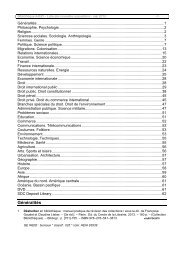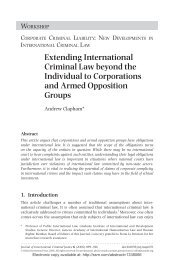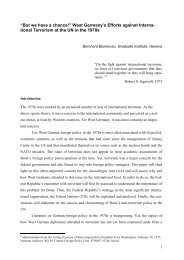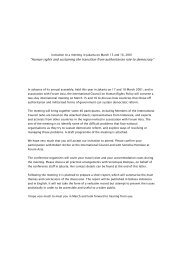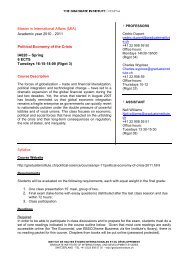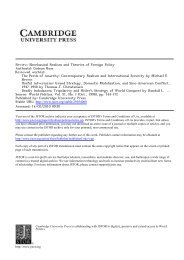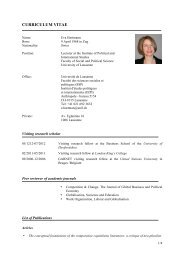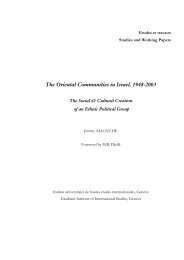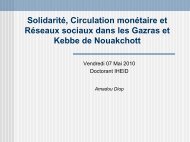Download - The Graduate Institute, Geneva
Download - The Graduate Institute, Geneva
Download - The Graduate Institute, Geneva
You also want an ePaper? Increase the reach of your titles
YUMPU automatically turns print PDFs into web optimized ePapers that Google loves.
and Sweden. States have resorted to diplomatic assurances in order to implement<br />
their anti-terrorism policies of deportation of individuals considered a threat to<br />
national security without violating the principle of non-refoulement. 10<br />
<strong>The</strong> various human rights protection regimes 11 link the prohibition of torture<br />
and other inhuman or degrading treatment to an obligation not to proceed to the<br />
extradition, expulsion, deportation or other type of (extra-legal) transfer of<br />
individuals to their country of origin or any other country if they will face there a<br />
real risk of torture or ill-treatment (principle of non-refoulement). 12 This additional<br />
obligation purports to reinforce the prohibition of torture by denying states the<br />
faculty to circumvent it without committing torture themselves by sending<br />
individuals to other countries, where they would be subjected or be likely to be<br />
subjected to torture. Any other understanding would risk to seriously compromising<br />
the effectiveness of the prohibition of torture. 13<br />
It should be also noted that the prohibition of torture and the principle of<br />
non-refoulement are of an absolute nature. This means, on the one hand, that they are<br />
non-derogable in times of war or public emergency 14 , and, on the other hand, that<br />
there can be no exception to them or any relaxation justified by the extraordinary<br />
circumstances of a case or the activities of the concerned individual. 15 As the ECHR<br />
has recently affirmed,<br />
“it is not possible to weigh the risk of ill-treatment against the reasons put<br />
forward for the expulsion in order to determine whether the responsibility of a<br />
State is engaged under Article 3...In that connection the conduct of the person<br />
10<br />
For the legal framework in the US, see Diplomatic Assurances, Statement for the Record by John B. Bellinger,<br />
III, Legal Advisor to the Secretary of State, Before the House Foreign Affairs Subcommittee on International<br />
Organizations, Human Rights, and Oversight, 10 June 2008, available at http://foreignaffairs.house.gov/<br />
110/bel061008.htm.<br />
11<br />
<strong>The</strong> scope of the ICCPR, the CAT and the ECHR is not identical as far as the prohibition of torture is<br />
concerned. <strong>The</strong> ICCPR and the ECHR do not explicitly provide for the prohibition to expose someone to the<br />
danger of being subjected to torture upon expulsion, return or extradition to another State, but the principle of<br />
non-refoulement has been recognized by the Human Rights Committee in its 2 nd General Comment on Article 7<br />
of the Covenant (see General Comment 20, Article 7 (Forty-fourth session, 1992), UN Doc. HRI/GEN/1/Rev.1<br />
at 30 (1994), § 9) and by the ECtHR in numerous cases starting from Soering v. UK, ECtHR, decision of 7 July<br />
1989, Application No. 14038/88, Ser. A No. 161 = 11 EHRR, pp. 439 et seq. On the contrary the CAT provides<br />
explicitly for the principle of non-refoulement (Art. 3), which only applies to the prohibition of torture (Art. 1)<br />
and does not extend to cruel, inhuman or degrading treatment prohibited in Art. 16 CAT. In addition to this,<br />
the acts of torture and cruel, inhuman or degrading treatment are punishable in the CAT only if committed by<br />
state officials. See the observations of Nowak, Manfred and McArthur, Elizabeth, THE UNITED NATIONS<br />
CONVENTION AGAINST TORTURE: A COMMENTARY, 2008, Oxford, Oxford University Press, pp. 165 et seq.<br />
12<br />
See Art. 3§1 of the CAT: “No State Party shall expel, return ("refouler") or extradite a person to another State<br />
where there are substantial grounds for believing that he would be in danger of being subjected to torture”.<br />
13<br />
See the observations of the European Court of Human Rights in Soering v. United Kingdom, judgment of 7<br />
July 1989, ECtHR, Ser. A No. 161 = 11 EHRR, pp. 439 et seq., §§ 87-88.<br />
14<br />
See, for example, Art. 15§§1-2 of the ECHR; Article 4§§1-2 of the ICCPR.<br />
15<br />
See Duffy, Aoife, Expulsion to Face Torture? Non-refoulement in International Law, 20 International Journal of<br />
Refugee Law (2008), pp. 373-390, passim; Arbour, Louise, In Our Name and On Our Behalf, 55 ICLQ (2006), pp.<br />
511-526, at 517-518.<br />
3


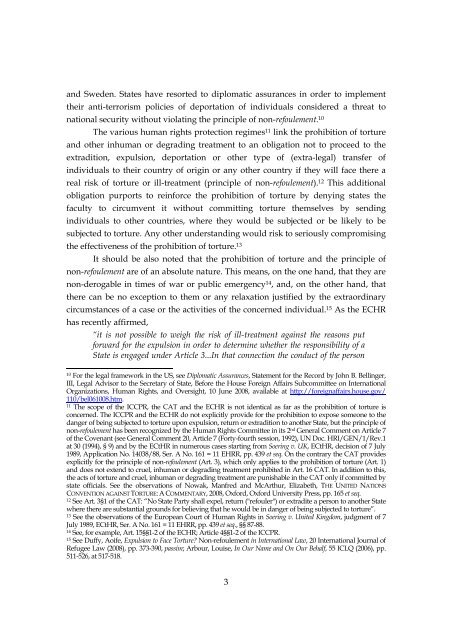
![Download [pdf] - The Graduate Institute, Geneva](https://img.yumpu.com/23370020/1/190x248/download-pdf-the-graduate-institute-geneva.jpg?quality=85)
